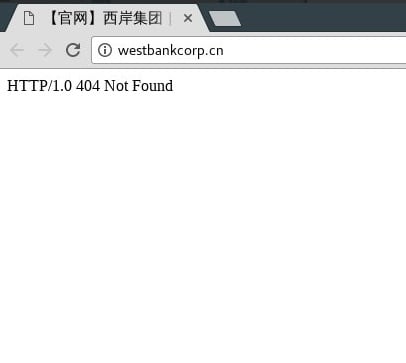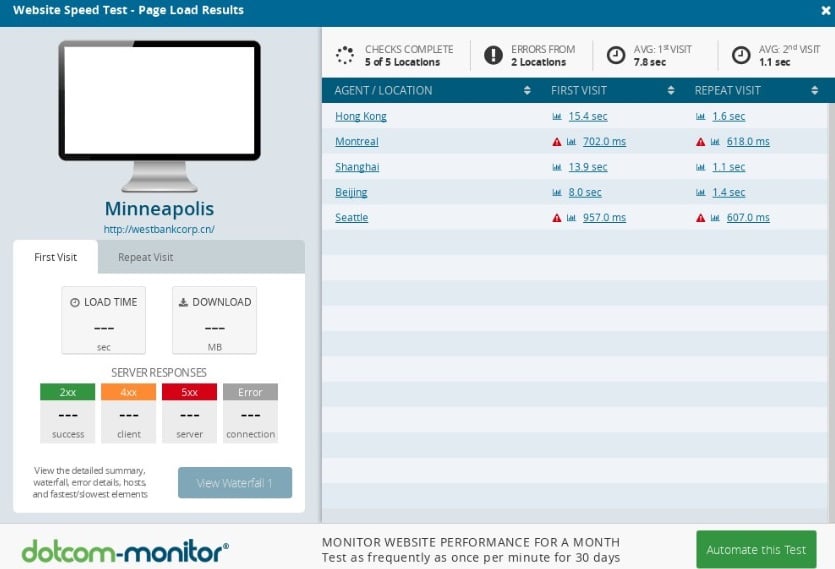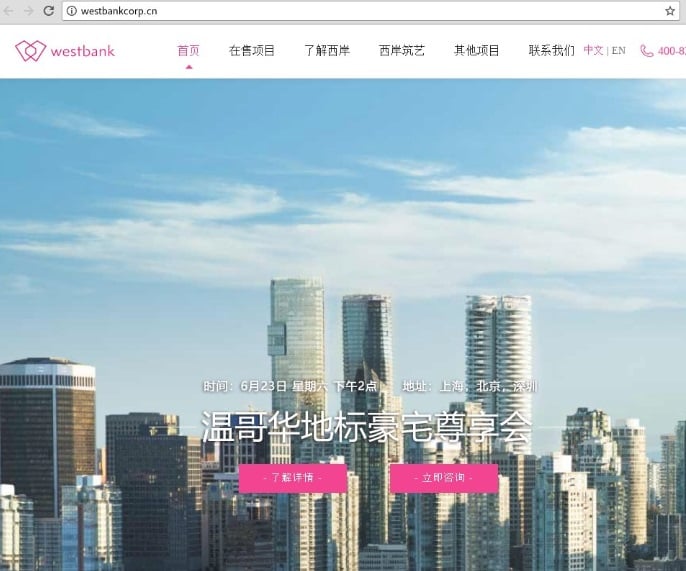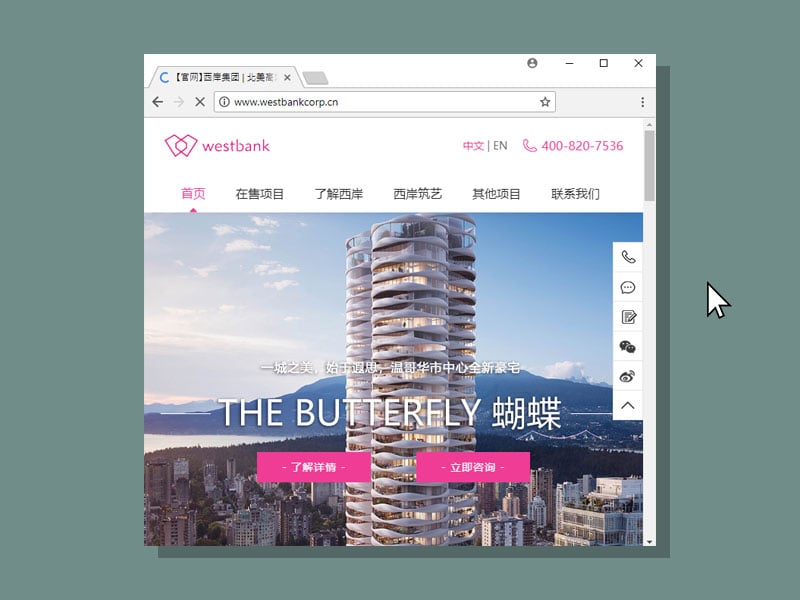Yesterday, gasoline was added to Vancouver’s fiery Twitter discussions on housing when local Internet users found that they were unable to access real estate developer Westbank’s Chinese website, www.westbankcorp.cn, which housing advocate Rohana Rezel says contains “issues causing unaffordability used as a sales pitch” to wealthy potential buyers overseas.
Rezel, a 39-year-old DevOps consultant, confirmed via testing that access to the website was limited to visitors from China and shared the news on Twitter, drawing criticisms by locals who felt sidelined in the search for secure housing amid wealthy global buyers.
This morning, Canadians were able to access the site.
The Tyee called and emailed Westbank for comment, but has not received a response by publishing deadline.*
The incident began yesterday June 14 at 6 a.m. when Rezel posted a letter to Prime Minister Justin Trudeau on his blog.
In that letter, Rezel shares that he was “dismayed and distressed” with March news that the federal government is considering a proposal to build 50,000 units of “workforce rental housing” by the Creative Housing Society in a plan valued at as much as $14 billion. The new non-profit was founded by Westbank, a prominent Vancouver developer whose projects range from luxury condos to hotels to mixed-use real estate, including social housing. The non-profit is being headed by Jennifer Keesmaat, Toronto’s former chief planner.
Rezel disagreed that a non-profit founded by Westbank would be a good fit to develop housing with public dollars, citing Westbank’s Chinese website which advertises Vancouver real estate as a popular investment with the global rich due to large gains, a low currency exchange rate and a low mortgage interest rate.
“It’s saying that Canada has become a safe deposit box for the rich, a good place to invest… essentially everything that housing advocates have said is causing housing prices to be out of whack with what local people can afford,” said Rezel. “And every one of these things is being used as a selling point. You wouldn’t see this from the English site.”
Westbank’s Chinese site, in Simplified Chinese used in mainland China, has different content than the English site. There are tips for people unfamiliar with Canadian real estate, immigration rules and quality of life.
Its media page features data from the Global Home Investment Return Index by Hurun Report — a popular Chinese source for reports on wealth and business — which shows that owning Vancouver property offers the best gains out of 50 cities in the world, thanks to high demand, a low exchange rate for the Canadian dollar and a low mortgage interest rate. On the same page, it states that 25 per cent down payment is required for condominiums and that presales can be transferred before completion with high gains. There are comparisons between investing in Canadian real estate and real estate in China, the U.S. and Australia.
The same page also offers information on Canada’s rental market and on returns from rental income for property owners.
A collection of pop-ups elsewhere on the site talk about how Canada’s water quality is the highest in the world, food quality is the safest in the world and the air is best in the world. The pop-ups also claim Canada spends 42.5 times per capita more on education than China, has a cheaper cost of education than the U.S. and the U.K and that foreign students graduating from Canadian universities can easily go on to become landed immigrants.
Photographs of Prime Minister Justin Trudeau with Chinese multibillionaire Jack Ma of the Alibaba Group and Trudeau with Westbank’s founder and CEO Ian Gillespie are featured on the site.
Westbank is Vancouver-based, but has offices in Toronto, Seattle, Hong Kong, Taiwan, Beijing, Shanghai, Shenzhen and Chengdu.
In Vancouver, it is the developer of a number of high-profile and iconic Vancouver developments, including the complex redevelopment of Woodward’s in the Downtown Eastside, and the upcoming The Butterfly, whose concept is by the late renowned architect Bing Thom, and Vancouver House, designed by Danish starchitect Bjarke Ingels. In Toronto, Westbank is developing Mirvish Village on the site of the old Honest Ed’s store, a multi-tower rental and retail project.
About an hour after Rezel published the letter to Trudeau on his blog, he found that the link to Westbank’s Chinese site gave him a 404 page-not-found response.

He asked friends who had non-Canadian proxies, which allow you to visit a website from a specific location, and found that visitors from Hong Kong, Beijing and Shanghai were able to access the site. Rezel found this odd as he was previously able to visit the site with a Canadian IP with no issues.


Rezel shared his experience on Twitter.
As of early Friday afternoon, four of Rezel’s tweets on the subject have received over 230 likes and 350 shares and counting, with much discussion by local housing advocates.
你好@westbankcorp 。我住在加拿大但是我看不到你的網站、為什麼呢?#vanre https://t.co/YMeoNieZWd
— Justin Fung | 馮凱威 (@jhwfung) June 15, 2018
Noteworthy: 13h ago, https://t.co/JZJYUIJjxb redirected to local #VanRE marketing site https://t.co/oq7KgHlkf8 (I verified). Only w/ internet proxy spoofing China as Mr. Rezel proved was real .cn offshore sales site revealed.
— Pete Fry (@PtFry) June 15, 2018
This morning (real) .cn site accessible to Canadians. https://t.co/hdXrnbcq0n
On the morning of June 15, Rezel noticed that Westbank’s Chinese site had returned for Canadians to access.
Something that vanished from Westbank’s English website but has not returned is an interview with Michael Braun, the developer’s marketing director. The interview can be retrieved on Wayback Machine’s Internet archives, which noted that it was still on Westbank’s website on Nov. 10, 2017 and possibly later.
In the interview (archived copy here), Braun states “that China is now a big part of this business. It’s a hindrance that I don’t speak Mandarin for example, in sales. And there is always the fear, what if the China market blows up? But right now I have a rule when we talk about projects if the Chinese market doesn’t want it, I have no interest in it.”
The Tyee emailed Westbank about the abrupt appearance of the Chinese site and the removal of Braun’s interview and phoned twice to follow up, but did not receive a response by publishing deadline.*
Rezel called the return of the Chinese site a “small win.”
Rezel is one of many keen social media users who scour data to find answers to housing affordability in Vancouver. Much sharing and debating takes place on Twitter under the hashtag #vanre, which can be a polarizing commons that both educates and enrages.
Recently, Rezel has spoken out against the ease with which Airbnb hosts in Vancouver can get away with operating short-term rentals without a city licence “as there’s currently no mechanism for platforms to validate licence numbers.” He was interviewed on CBC’s Early Edition about this by host Stephen Quinn and, while on the air, offered the city free help.
“I think it’s come to the point where people can no longer rely on elected officials and bureaucracy to fix the housing crisis,” said Rezel. “Citizens need to be aware, take a firm stand and be willing to speak out.”
News of Canadian condos pitched to overseas buyers often draws criticism from Vancouverites in their housing-crunched city. A February Globe and Mail article on a Westbank’s condo sales presentation in Singapore angered many Canadian readers.
“Supply is not going to help as long as there’s toxic demand,” Rezel said. “We need to clean up the demand side and build sustainable supply. Ultimately, we need more supply — there’s no question about it. But with so much toxic demand, no model of supply’s going to work, especially if it’s supply targeted at wealthy investors from abroad…. Homes should be for shelter.”
The effect of global wealth on Canadian housing markets is tricky to measure.
The Canada Mortgage and Housing Corporation found earlier this year that about five per cent of Metro Vancouver properties were owned by non-residents; but an analysis by Andy Yan, director of the Simon Fraser University’s City Program, shows that one in five of the region’s newly built condos are owned by people residing outside of Canada. A New York Times report said that this “helps to explain why a surge of building hasn’t done much to reduce prices.”
Experts say data on foreign ownership is hazy because the above measures exclude Canadian immigrants with money earned from overseas.
Update from June 18, 2018 at 9:05 a.m.:
The Tyee has not received a response from Westbank at this time, but a piece published yesterday in Vancouver’s StarMetro contains a response from the developer on the Chinese website controversy.
Michael Braun, Westbank’s marketing director, emailed StarMetro, saying that the reaction over the company’s “technical glitches” and “past statements” by individuals and groups is “an effort to promote their own agenda and personal opinions.”
“The majority of those appear to have no regard for facts,” Braun’s statement says. “They fail to recognize that Westbank pioneered the Local First initiative, which is now being replicated by many developers and municipalities.”
Braun said that Westbank uses simplified Chinese in its marketing materials because Chinese is the mother tongue of more than 40 per cent of Vancouver’s population. ![]()
Read more: Housing
















Tyee Commenting Guidelines
Comments that violate guidelines risk being deleted, and violations may result in a temporary or permanent user ban. Maintain the spirit of good conversation to stay in the discussion.
*Please note The Tyee is not a forum for spreading misinformation about COVID-19, denying its existence or minimizing its risk to public health.
Do:
Do not: